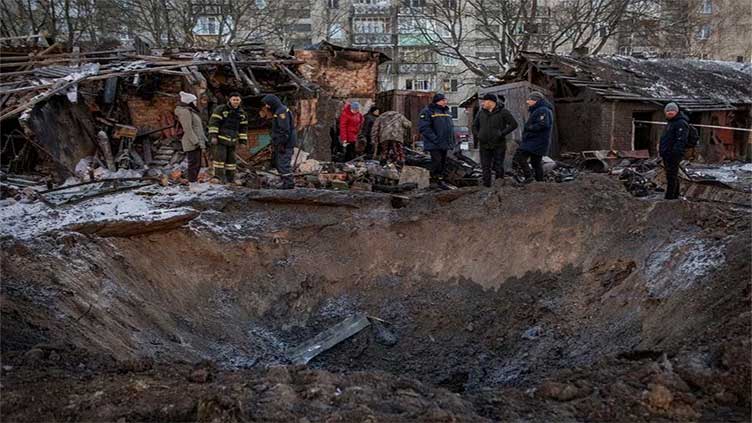Russian air strikes focus on Ukrainian military industry for now - Kyiv

World
Ukrain had warned for months that Russia may target its energy system for a second winter
(Reuters) – Russia has focused its recent air attacks on the Ukrainian military-industrial complex although the threat to energy facilities remains high, a senior military spy official was quoted as saying on Monday by the RBC-Ukraine news site.
Ukrainian officials have warned for months that Russia may target its energy system with missile and drone strikes for a second winter. Last year air strikes heavily damaged power facilities, causing blackouts for millions.
Asked about a spate of major Russian air strikes since Dec. 29, Vadym Skibitsky, deputy head of Ukraine's military spy agency, said the same trend had not repeated so far and listed various targets Russia had aimed at.
"These are primarily objects of our military-industrial complex, headquarters, control systems and separate units that are located on the front line," he was quoted as saying.
Skibitsky said the weapons used for the strikes were far from accurate, resulting in civilian suffering.
"Indeed, in December there was the most massive use of unmanned aerial vehicles of the Shahed type," he said, adding that Russia had used about 770-780 of the drones in its attacks.
Moscow stepped up large-scale strikes over the holiday period and in late December carried out one of its biggest aerial assaults yet of the almost two-year-old war.
The Ukrainian military does not usually detail the aftermath of Russian strikes when it comes to its military complex though it did acknowledge that military facilities were among recent targets.
The attacks come as Kyiv increases efforts to ramp up domestic military production to ensure stable supplies and become less dependent on foreign partners, which face their own shortages and cannot meet Kyiv's battlefield needs.
Despite the current trend, Ukraine's energy grid is still under threat, Skibitsky said.
"The enemy continues to regularly carry out space footage of our energy facilities to launch such strikes if possible and if necessary," he said.
Emergency in Russia's Voronezh city after Ukraine drone attack
The mayor of the southern Russian city of Voronezh declared a state of emergency on Tuesday after what officials said was a Ukraine-launched drone attack that damaged several buildings and wounded a child.
People from at least one apartment building were evacuated to a nearby school after drone debris sparked a small fire and blew out windows, Mayor Vadim Kstenin said on the Telegram messaging app.
Windows in other buildings were also shattered, he said, adding: "The introduced state of emergency in the city will ... allow for a prompt implementation of measures to replace them."
The governor of the region, Alexander Gusev, said on his Telegram channel that a girl was injured when drone debris fell onto her apartment building.
On its Telegram channel, the Russian defence ministry said it had destroyed five drones and intercepted three others overnight over the Voronezh region, which borders Ukraine. Voronezh city is the administrative centre of the region.
The ministry also said that it intercepted four drones in the nearby Russian Belgorod region.
Voronezh, a city of more than 1 million people, lies some 250 kilometres (155 miles) from the border with Ukraine.
There was no immediate comment from Ukraine. Kyiv has intensified its air attacks in recent months in what it says are strikes targeting Russian military infrastructure to undermine Moscow's war efforts.
Russia has an air base near Voronezh city, where some Sukhoi Su-34s bombers are based, according to Russian media. Russia often deploys the fighter-bomber aircraft during air strikes on Ukraine.
Russian news outlet Shot reported on Telegram that at least 15 blasts were heard near the air base and some drone debris fell nearby onto an apartment building.
Reuters could not independently verify the reports.


